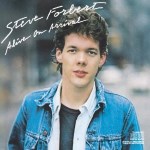 In 1998, the Timberline Lodge outside Portland, Oregon was filming a number of acoustic sets of notable musicians. One of them was Steve Forbert. But the lodge was snowed in. No one could get there, so I was one of maybe 5 people in the audience. I sat about a foot away from him as he performed. It was a magical moment because Forbert had been a hero of mine since I was in my teens.
In 1998, the Timberline Lodge outside Portland, Oregon was filming a number of acoustic sets of notable musicians. One of them was Steve Forbert. But the lodge was snowed in. No one could get there, so I was one of maybe 5 people in the audience. I sat about a foot away from him as he performed. It was a magical moment because Forbert had been a hero of mine since I was in my teens.
In Loudon Wainwright’s great “Talking New Bob Dylan,” he pegs Forbert pretty well as a variation of Bob Dylan:
Steve Forbert and Springsteen, all in a line
They were lookin’ for you, signin’ up others
We were new Bob Dylans, your dumb ass kid brothers
Well, we still get together every week at Bruce’s house
Why, he’s got quite a spread I tell ya, it’s a twelve step program.
Discovering Steve Forbert
I was at the mall recently and over the sound system, I heard little Steve Forbert. It reminded me how much I used to like him.
The song was, of course, “Romeo’s Tune” — the only song of his that was ever a hit as far as I know. Of course, I haven’t followed his career for about two decades. But unless all his intelligence and talent left him, I can’t imagine how he would have found himself in the top 40 again. Anyway, I figured it would be a good idea to start with it because most people don’t know who Steve Forbert is.
“Romeo’s Tune” is off his second album, Jackrabbit Slim. So I’m going to jump back below because I love his first album.
But the nice thing about Steve Forbert’s hit song is that it is fully in keeping with his other work. It’s a wonderful song. And as a lyric writer, he’s more of a poet than almost any songwriter I can think of. “Let me smell the moon in your perfume”? That’s such a lovely enigmatic line!
Goin’ Down to Laurel
 Okay, let’s go back to the beginning of Steve Forbert, Alive on Arrival.
Okay, let’s go back to the beginning of Steve Forbert, Alive on Arrival.
I remember reading that the agent who originally snagged Steve Forbert found him playing in a punk club. Although in a certain way, that seems bizarre, in another way, it makes perfect sense.
To me, punk isn’t about a style of music, but an approach to music. Listen to that first Bob Dylan album and tell me if that doesn’t sound punk to you. Steve Forbert on album doesn’t sound so very punk, but he does live. It’s the production. Most of his albums have been really beautifully produced, and that is not very punk.
I mentioned this because I am presenting “Goin’ Down to Laurel” first. Forbert was born in Meridian, Mississippi. It’s a town of about 40,000. And Laurel is about 50 miles south of it — with a population of a bit less than 20,000. But there were more people in Laurel when Forbert was growing up — it’s been falling steadily. So maybe when he sings, “It’s a dirty, stinking town,” he is right.
But what I find fascinating about the song is that he is singing as something of a bad boy — or at least a confident one who is in his element. He’s going down south to see a “little girl” who he says is “a fool” for loving him. And I suspect that as long as he was in Mississippi, he was that person. But the same album has the songs that he clearly wrote after he moved to New York. I’ll highlight one of those songs later. But for now, just bask in self-assurance. And remember it.
Big City Cat
After the last Steve Forbert song “Goin’ Down to Laurel” where he plays the bad boy, I wanted to offer a very different track off Alive on Arrival. The song is “Big City Cat.”
It’s a funny song. He’s talking about his life after moving to New York. Most of the song is just about the feel of the big city with its sights and sounds. The only indication that things are not going that well is when he says, “I’m getting so skinny it hurts to sit down.” This reminds me of once a few years ago when I got down to 99 pounds and it did indeed hurt to sit down.
But the whole song turns into a kind of musical version of The Zoo Story toward the end. He’s living in one of those dreary places with a shared bathroom. And some kind of “lunatic” has been following him. Now the guy is hanging out in his hallway, leading to him being afraid to use the bathroom.
But he ends the song with the wry observation that this is all that he wanted, “I’m supposed to be happy; I’m here where it’s at; I’m a face in the crowd; I’m a big city cat!” Yeah, maybe Laurel wasn’t such a dirty stinking town after all.
Say Goodbye to Little Jo
 Okay, now we move back to Steve Forbert’s second album, Jackrabbit Slim. It was his most popular album because of “Romeo’s Tune.” But it also had “Say Goodbye to Little Jo,” which I think got a fair amount of play — at least on AOR stations.
Okay, now we move back to Steve Forbert’s second album, Jackrabbit Slim. It was his most popular album because of “Romeo’s Tune.” But it also had “Say Goodbye to Little Jo,” which I think got a fair amount of play — at least on AOR stations.
It’s a lovely song. It’s about a break-up. The implication is that it’s kind of a pep-talk the singer is giving to himself: let her go; don’t be a jerk; it’s your own damned fault anyway. There’s also the implication that Little Jo was the one. Break-ups before were easy enough to get through, but this one is going to be different.
This song reminds me a lot of Jules Shear. But that’s hardly surprising. There’s a reason why I admire the two of them so much. But this song has the emotional complexity that I associate with Shear. It’s kind of like one of my all-time favorite Shear tunes, The First Freeze After The Fall. But that song is more about grabbing hold of the pain and cherishing it. That’s in “Say Goodbye to Little Jo,” but it isn’t the focus.
Cellophane City
 Now we move to Steve Forbert’s third album, Little Stevie Orbit. It’s actually a very upbeat album — even a bit unhinged at times. But the song I most remember from it is the subdued “Cellophane City.” It’s one of the songs that brings to mind William Goldman’s line about Hollywood, but which applies equally well to the music business, “No one knows anything.” It sounds like a hit to me — at least on AOR. It wasn’t.
Now we move to Steve Forbert’s third album, Little Stevie Orbit. It’s actually a very upbeat album — even a bit unhinged at times. But the song I most remember from it is the subdued “Cellophane City.” It’s one of the songs that brings to mind William Goldman’s line about Hollywood, but which applies equally well to the music business, “No one knows anything.” It sounds like a hit to me — at least on AOR. It wasn’t.
Typical of this period of Forbert, the production is exceptional. Or it is just the kind of production that I most like in popular music. Sure, I may admire the more flashy production of Bob Ezrin and Jim Steinman. But its music like this that I listen to again and again. It is probably because it is really creative, but it never crosses that line of being an end in itself. I think Forbert brought that out in producers, given he had different ones.
The refrain in the song “cellophane city” gives the wrong impression about its meaning. It’s really not about some Peyton Place. It’s about one man and how he deals with the infidelity of what sounds like a wife, “He stood in the kitchen, she told him a lie; she left around 7 and kissed him goodbye…” But he gets over it.
The last verse is definitely the best because it puts the man’s previous behavior in context and shows that there is a better way:
You pulled a few tricks and you hang on a cross
This sepulcher is emptying, yeah all is at peace
We know you’re with Magdalene and you’re sailing for Greece.
That’s right: everyone knows; no one cares; get on with your life. Martyrdom is for chumps. Like a lot of Steve Forbert songs, it manages to be didactic but without the listener knowing it. So there you have your lesson for the day! And a really beautiful song:
Lost
 Steve Forbert’s fourth self-titled album was, well, weird. It was all over the map. Whereas his earlier albums were incredibly consistent, he decided to spread out on this one. I can’t blame an artist for wanting to do this. But from the standpoint of a listener, it can be a bit disconcerting. It didn’t do well. It led to him losing his record contract.
Steve Forbert’s fourth self-titled album was, well, weird. It was all over the map. Whereas his earlier albums were incredibly consistent, he decided to spread out on this one. I can’t blame an artist for wanting to do this. But from the standpoint of a listener, it can be a bit disconcerting. It didn’t do well. It led to him losing his record contract.
But I think it’s a fine album. I do think it’s over-produced, and that’s too bad given his first three albums. But it has Steve Forbert’s usual range of emotion and wit. I don’t think it has a single bad song on it. There is a feeling I have a lot with him that I’d rather just listen to him alone with a guitar. He doesn’t need production, even if he was usually served well by it.
I’m going to highlight probably the most low-key song on Steve Forbert, “Lost.” I still think it is over-produced. But it’s such a fine song. And it’s from a perspective we don’t hear much in music — at least like this. It’s about the other man. The singer is talking to the ex of his new lover. The refrain is, “I’m lost in your sweetheart’s arms.” It’s what the other man in The Tennessee Waltz would sing.
He takes no pleasure in the pain he is inflicting on the other man. And he’s not even sure if the woman loves him, “Is she poison? Man, I just can’t tell.” But he’s so in love that he wants her to run off with him and get married. It reminds me of how I used to think when I was younger: that men should be willing to sacrifice their desires out of a kinship of manhood. Think of the ending of Casablanca. But if men can’t do that, they can at least be aware of what they are doing, as in “Lost.”
In saying this, I’m well aware that this a male-centric way of looking at relationships. This is partly why I no longer look at relationships in this way. (More important is that I just don’t see monogamous relationships as being that realistic or healthy.) But overall, everyone would be happier if they at least noticed the pain they cause others.
Steve Forbert Live
 For years, I’ve looked to see if that 1998 concert ever came out on video. It didn’t. Part of it is on the album, Timberline Acoustic Series. But that’s just audio.
For years, I’ve looked to see if that 1998 concert ever came out on video. It didn’t. Part of it is on the album, Timberline Acoustic Series. But that’s just audio.
There is surprisingly little Steve Forbert live online. I am getting used to the fact that my tastes are not those of other people. Talking to Will a couple of years ago, I learned that he doesn’t think that much of Forbert. But I must note that in his old age, Will’s taste in music has really deteriorated. Then he made me listen to the Meghan Trainor song NO. All I could think to say was that it sounded like a Meghan Trainor song.
Anyway, the only suitable video I could find was the following 1979 performance at the Capitol Theatre in New Jersey. It’s good, but I’ve already featured the first two songs of it: “Romeo’s Tune” and “Goin’ Down To Laurel.” And it limits his work to the first two albums. But it’s a fine performance. And it’s an excellent way to spend an hour.
Recent Work
Here is a short set from 2015 in support of his album Compromised, which is very good:






Only wish you had gone one album further. You stop just before “Streets of this Town”, which was a bit of a “comeback” album – and one of his best.
Thanks for the recommendation. I will get it right away. But it does kind of explain why these are the four albums I know: by the time his fifth album came up, I was neck deep in the world of physics — and I didn’t have much time for anything else. But now I want to go back and see what I missed. Thanks!
Frank, just found your article on Steve Forbert.. I’m currently revisiting his early works on Spotify.
Interesting how the 2018 comment wishes you’d included Streets of This Town.. while his next album The American In Me is exactly what I’d have wished..
The American In Me is an American masterpiece, filled with candid, insightful offerings through a lens of maturity & middle age. The uptempo rockers on the album kick up a notch beyond his earlier works.. while the quiet, introspective numbers maintain a consistent quality.
This is possibly his most complete album.. and a shame it didn’t receive more acclaim.
Thanks for the recommendation. I’ll have to check it out. I just listened to the sample on Amazon and it does sound good. And with John Prine dead and Tom Waits not releasing anyway, what else do I have to buy?